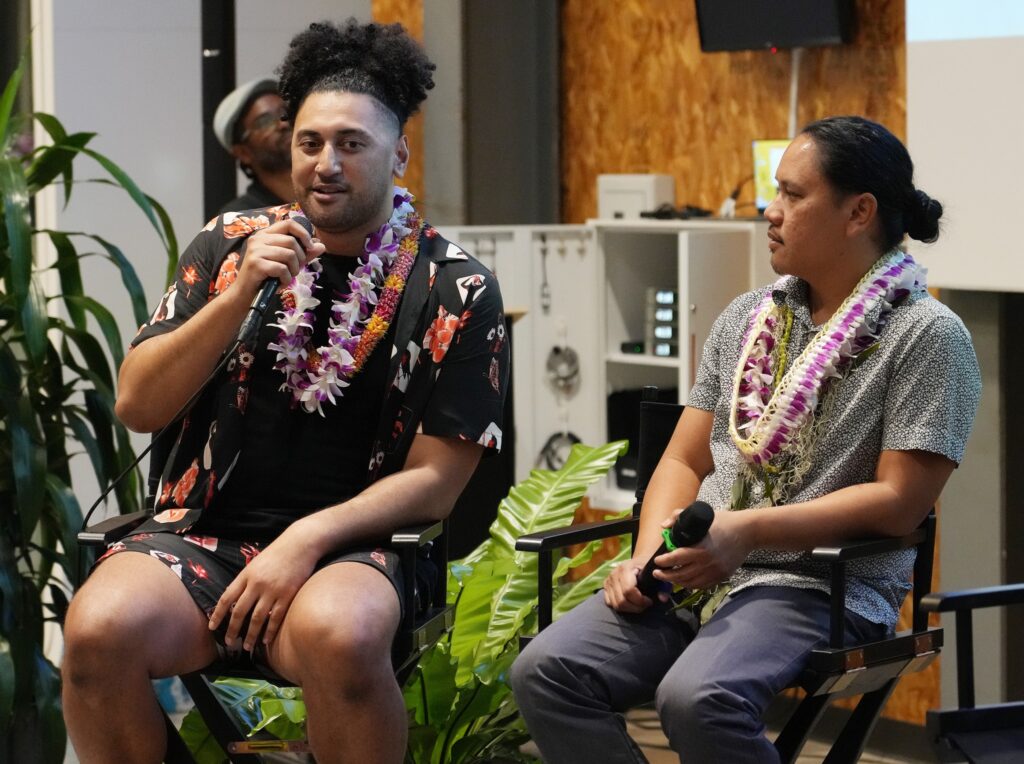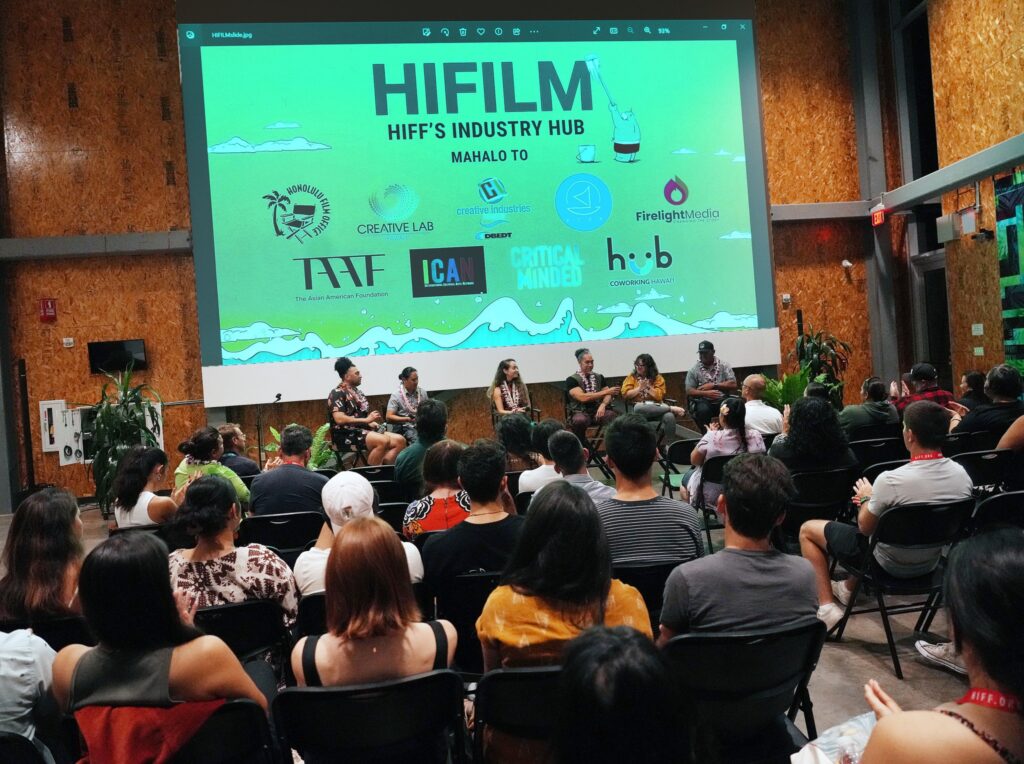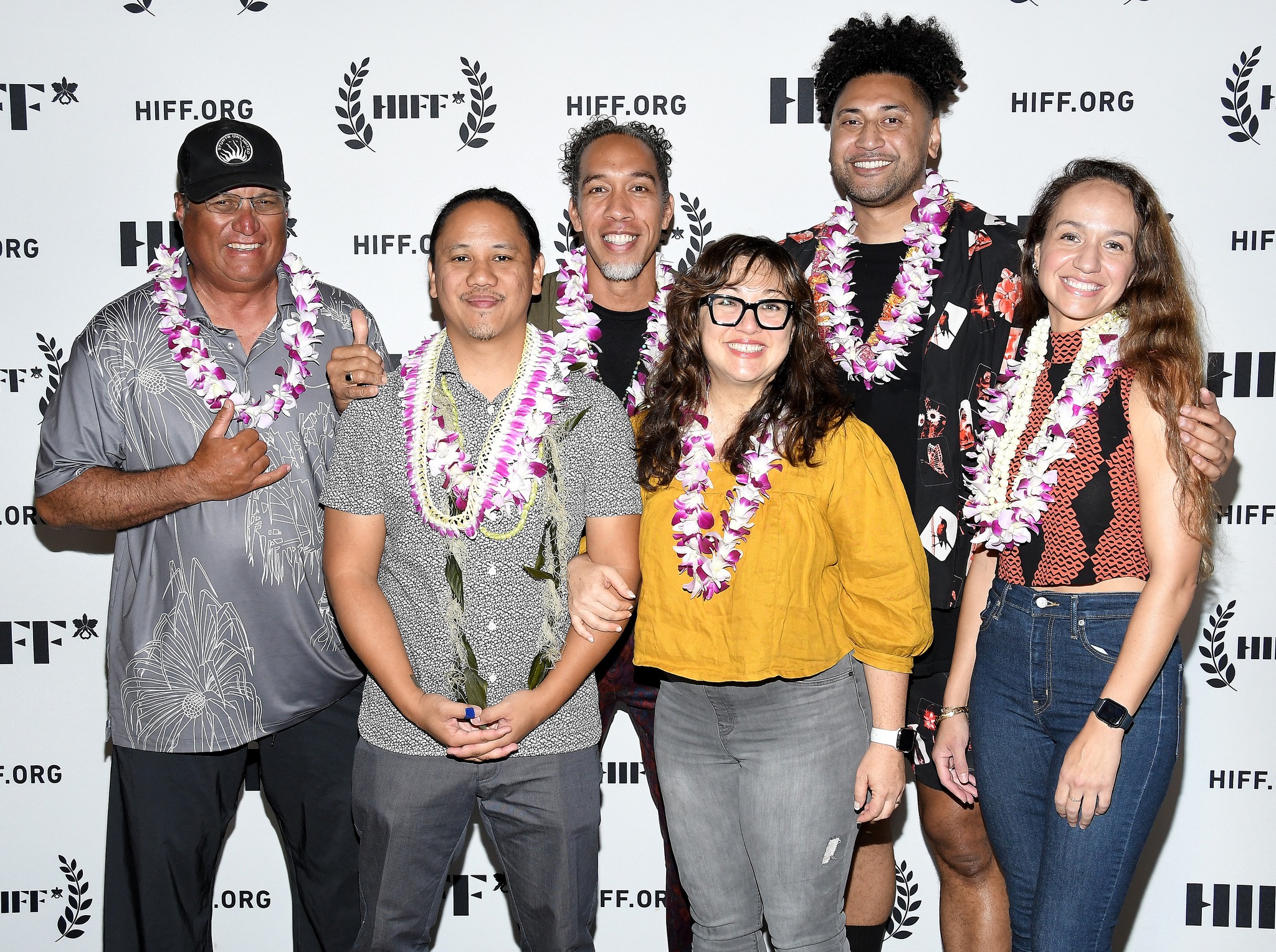(L to R) The Rise of Hawa‘i Cinema HIFILM Panelists: Brian Kealana; Ty Sanga; Moses Goods; Ciara Lacy; Kristian “Krit” Fanene Schmidt; Kalikolehua Hurley
I had the privilege of attending THE RISE OF HAWAI‘I CINEMA, a HIFILM Panel presented by Pasifika Entertainment Advancement Komiti (PEAK), which took place on October 9th during the 43rd Hawai‘i International Film Festival. This panel was one of eight panels and masterclasses for HIFF43, which were open to all Industry passholders.
The panelists included Kānaka Maoli professionals working in the entertainment industry. It featured a Q&A and discussion on the current and future states of the entertainment industry in Hawai‘i.

This panel was moderated by Kristian “Krit” Fanene Schmidt, executive director at PEAK, and Ty Sanga, director and recipient of HIFF43’s Made In Hawai‘i Feature award for his film, HŌKŪLE‘A: FINDING THE LANGUAGE OF THE NAVIGATOR. The panelists included Kalikolehua Hurley, a senior manager at Walt Disney Animation Studios; Moses Goods, an actor and playwright; Ciara Lacy, a filmmaker and HIFF alumna; and Brian Keaulana, a stunt coordinator and producer.
First of all, I want to mention how exciting and inspiring it was to attend this panel in which all the featured panelists were Kānaka Maoli (Hawaiian), working in their respective field within the entertainment industry. From actors to producers to directors, I appreciated how each panelist had something to contribute from their unique perspectives. As the panel was open to HIFF Industry passholders, it was also noteworthy that I was surrounded by filmmakers and entertainment industry professionals based in or from Hawai‘i, which is an experience I’ve never had before.
The central focus of the discussion surrounded “the new wave of Hawai‘i cinema,” or in other words, the emerging filmmakers and creatives in Hawai‘i and the new opportunities for the types of stories being told about Hawai‘i–and who gets to tell them.
Since the beginning of the film industry in Hawai‘i, Hollywood has shot many major productions here from feature films to television shows. Throughout the decades of mainstream productions filmed in Hawai‘i, Hollywood has either completely erased or, at best, made lackluster attempts to portray Native Hawaiians and Hawaiian culture. These issues include white washing, harmful stereotyping, and poor representation in general.
With this in mind, it was empowering to see a panel of Kānaka Maoli discussing and sharing their experiences within the entertainment industry and their efforts in taking back control of the narrative of the stories being told about Hawai‘i.
By the end of the panel, many audience members asked questions and shared ideas in regards to elevating filmmaking and the film industry in Hawai‘i. It was evident how engaged the audience was, as well as how important conversations like these are, and how more of these conversations need to happen.

Ciara Lacy, when asked about her vision for the future of Hawaiian cinema, talked about her hopes for bridging the gaps between big and small productions and finding a way to support each other. She also hopes to see local filmmakers give themselves permission to do different kinds of films, such as narratives not expected of the communities here.
Moses Goods, in response to pushing back on offensive narratives when reading a script, shared that he makes sure that his voice is heard when he enters a project. He also shared that when he’s working with Hollywood productions, he makes sure to “play it the Kanaka way.”
Kalikolehua Hurley talked about her perspective as a Kanaka Maoli woman working for a major production company, as she is sometimes the only indigenous person or woman in a space. She also champions for the underdogs and underrepresented in the stories being told.
Brian Keaulana discussed building the film economy in Hawai‘i and how he hopes productions employ local people, above- and below-the-line, rather than bringing over production members from overseas. He also talked about his desire for designing new infrastructure, such as creating more production studios and facilities to employ more Kānaka in the industry here.
 Sean Oketani is a recent graduate from Chapman University’s Dodge College of Visual Film and Media Arts with a BFA in Television Writing and Production. He is passionate about writing and creating compelling media. In his free time, he enjoys taking photos, going to the beach, and consuming various forms of media. Sean is also an intern at this year’s HIFF43, as a contributing writer to the HIFILM blog.
Sean Oketani is a recent graduate from Chapman University’s Dodge College of Visual Film and Media Arts with a BFA in Television Writing and Production. He is passionate about writing and creating compelling media. In his free time, he enjoys taking photos, going to the beach, and consuming various forms of media. Sean is also an intern at this year’s HIFF43, as a contributing writer to the HIFILM blog.
The HIFF ONLINE CREATIVES & CRITICS IMMERSIVE (HOCCI) program supports sustainable film criticism in Hawai‘i through mentorship and paid career opportunities. The mission of HOCCI is to broaden diversity in film criticism across the Pacific region and use influencer branding strategies to spark career opportunities in Hawai’i, not be hampered by oceans, state borders and distance, because geography is no longer a barrier. The 2023 HOCCI is supported by Critical Minded, a grant-making and learning initiative that supports cultural critics of color in the United States.



